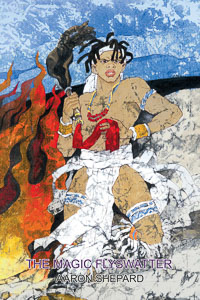Here is the note that appeared in my mini-novel.—Aaron
The Mwindo epic comes from the Nyanga, one of the Bantu-speaking peoples that live in the mountainous rainforests in the east of the Congo. (A former name of the Congo was Zaire). In the 1950s, when the epic was collected, the Nyanga numbered about 27,000. Traditionally, they are governed by chiefs, each one ruling over several villages.
The Nyanga themselves have no written version of the Mwindo epic, so it has never reached a standardized form. Of the four versions transcribed and published by outsiders, no two are even nearly the same—and no doubt there are many other distinct versions.
The epic is performed as simple entertainment by amateur bards. The bards’ performance includes song and dance, accompanied by drummers and other musicians. Only a portion of the epic is performed at a time, as a complete performance would take too long.
Following are notes on particular elements of the story.
Mwindo. The Nyanga do not seem to claim Mwindo as a historical figure, and there is no reason to believe he was one. The name itself has no remembered meaning, but it is now commonly given to a son born after many daughters.
She‑Mwindo. The name means “father of Mwindo”—so, of course, it could not really have been his name when the story starts!
Bride-price. In most of Africa—and in many other cultures worldwide—it is the custom for a groom and his family to send a substantial wedding gift to the family of the bride. This is basically the reverse form of “dowry,” a custom that is common elsewhere. Names for the gift include “wooing present,” “bride-price,” and “bride-wealth.” Where this is practiced, the birth of many sons can impoverish a family, while the birth of many daughters can enrich it.
Conga. This is a flyswatter with a scepter‑like handle of wood. The swatter attached at the top can be leaves, an antelope tail, or, as in this story, the tail of a Cape buffalo. A conga is included in the regalia of a chief, and so signifies here the destiny of Mwindo.
Lightning. To the Nyanga, Lightning is a god who may be entreated to intervene in human affairs by sending down his bolts. He is the only Nyanga god who lives in the sky. How his bolts can reach underground to the land of the gods is a mystery.
Land of the gods. The Nyanga say the gods live in their own land underground, where the dead also go. Except for being cold and dreary, it is much like the land of the Nyanga.
Nyamurairi. The gods’ own chief is Nyamurairi. He is the god of fire, and also the ultimate giver of life and death. His home village is where the dead reside.
Kahindo. This goddess, who appears here as Nyamurairi’s daughter, is sometimes identified with Kahombo, the goddess of fortune.
Bananas, porridge. The staple food of the Nyanga is the banana—not the sweet fruit known to most of us, but the plantain, a starchy fruit. Among the Nyanga, it is dried, pounded, ground into a flour, and cooked as a porridge.
Though this retelling is in my own words, I’ve done my best to retain the flavor of the original. Sources for the retelling were:
The Mwindo Epic: From the Banyanga (Congo Republic), edited and translated by Daniel Biebuyck and Kahombo C. Mateene, University of California Press, Berkeley and Los Angeles, 1969. (Banyanga means “the Nyanga people.”)
Hero and Chief: Epic Literature from the Banyanga, Zaire Republic, Daniel P. Biebuyck, University of California Press, Berkeley, Los Angeles, and London, 1978.
